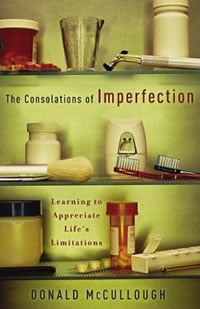Book Notes
 Donald McCullough, The
Consolations of Imperfection; Learning to Appreciate Life’s
Limitations (Grand Rapids:
Brazos, 2004)
Donald McCullough, The
Consolations of Imperfection; Learning to Appreciate Life’s
Limitations (Grand Rapids:
Brazos, 2004)
Perfection, Anne Lamott once observed, is the voice of the oppressor. But the lure of life without limits is part of our American mythos; its power is nearly irresistible. You can be and do anything, we are told. As inspirational as this truism sounds, and I have used it with my own children, to be perfect, to live as if there are no limits, is a burden you would not wish on your worst enemy. “Unable to accept ourselves as we are,” writes Joan Chissister, “we wear ourselves out in an effort to become unimpeachable.”
Unless you heed the wisdom of Donald McCullough, a former Presbyterian pastor and seminary president. In an earlier book called The Wisdom of Pelicans; A Search for Healing at the Water’s Edge (2002), McCullough recounts how his marriage failed from circumstances and poor choices, and then how he was later fired as president of a seminary even though he had tried hard to make amends. In his most recent book, he casts a far broader net. All of us, in many ways, and despite the lie that culture feeds us, will “collide with the inevitable” limits of life. The key, writes McCullough, is to embrace these limitations as consolations.
Limits in life run broad and deep, and McCullough explores most all of them. Each chapter treats a specific limit, and then shows how and why it might be construed as a blessing: the limitations of the body, relationships, knowledge, achievement, moral goodness, spirituality, romance, sex, confidence, public approval, money, competitiveness, control, freedom, pleasure, the senses, time and optimism. McCullough is a Christian, and so in his final chapter he explores the “limitations of limitations.” Most of us fear our limitations and try hard to repress those fears. In an effort of what we think is self-survival, we deny the ultimate limitation of death, but the Christian Good News is that in an act of supreme self-sacrifice God “conquered death and brought life and immortality to light” (2 Timothy 1:10). So McCullough’s final sentence, “This triumph of life means that we, too, can find our voices and our songs for singing” (p. 196).


